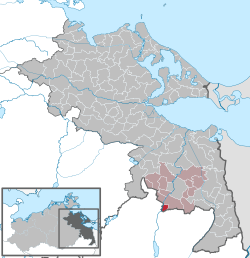Nieden | |
|---|---|
 Location of Nieden | |
| Coordinates: 53°26′22″N13°55′21″E / 53.43944°N 13.92250°E | |
| Country | Germany |
| State | Mecklenburg-Vorpommern |
| District | Vorpommern-Greifswald |
| Municipal assoc. | Uecker-Randow-Tal |
| Government | |
| • Mayor | Roswitha Retzlaff |
| Area | |
• Total | 6.49 km2 (2.51 sq mi) |
| Elevation | 25 m (82 ft) |
| Population (2023-12-31) [1] | |
• Total | 158 |
| • Density | 24.3/km2 (63.1/sq mi) |
| Time zone | UTC+01:00 (CET) |
| • Summer (DST) | UTC+02:00 (CEST) |
| Postal codes | 17309 |
| Dialling codes | 039740 |
| Vehicle registration | VG |
| Website | www.amt-uecker-randow-tal.de |
Nieden (Polabian Nadam [2] ) is a municipality in the Vorpommern-Greifswald district, in Mecklenburg-Vorpommern, Germany.


